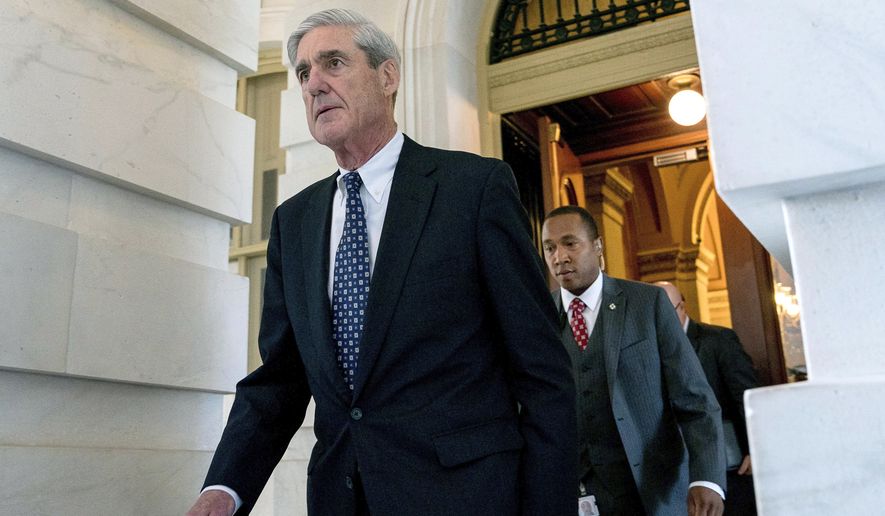A federal judge says “even a blind person” can see that special counsel Robert Mueller is prosecuting Paul Manafort as a way to acquire evidence against his “true target,” President Trump.
U.S. District Judge T.S. Ellis III made the comment in an opinion released this week that nonetheless sided with Mr. Mueller and against Mr. Trump’s former campaign manager. He rejected Mr. Manafort’s argument that the Mueller-brought tax-evasion indictment exceeded the special counsel’s authority and should be dismissed.
Judge Ellis, sitting in the Eastern District of Virginia, expressed dismay at the special counsel system and at Mr. Mueller in particular.
“Given the investigation’s focus on President Trump’s campaign, even a blind person can see that the true target of the Special Counsel’s investigation is President Trump, not defendant, and that defendant’s prosecution is part of that larger plan,” he wrote. “Specifically, the charges against defendant are intended to induce defendant to cooperate with the Special Counsel by providing evidence against the President or other members of the campaign. Although these kinds of high-pressure prosecutorial tactics are neither uncommon nor illegal, they are distasteful.”
In negotiations between Mr. Mueller and Trump attorneys over a possible interview, the prosecutor has said Mr. Trump isn’t a target — a specific Justice Department term that means the government has evidence the person committed a crime.
Legal experts say prosecutors will file numerous charges, creating huge legal defense costs, to force targets to talk.
SPECIAL COVERAGE: Best of 2020: Top stories and columns from The Washington Times
Mr. Manafort’s former business partner, Rick Gates, agreed to plead guilty last February and become a prosecution witness against his old friend. He cited legal costs as a reason.
Judge Ellis, appointed by President Ronald Reagan, also attacked the Justice Department for letting special counsel powers get out of hand. Justice replaced the old “independent counsel” law with a new set of “special counsel” regulations meant to rein in open-ended criminal probes the last for years with unlimited budgets.
“The regulations do not require the Special Counsel’s investigation to be limited as to time or budget,” he wrote. “Thus, to provide a Special Counsel with a large budget and to tell him or her to find crimes allows a Special Counsel to pursue his or her targets without the usual time and budget constraints facing ordinary prosecutors, encouraging substantial elements of the public to conclude that the Special Counsel is being deployed as a political weapon.”
Judge Ellis said Mr. Mueller is under public pressure to charge people in the Trump campaign.
“If a Special Counsel discovers no criminal activity then the investigation is likely to be perceived as a waste of time and resources, and thus a Special Counsel has a strong incentive to find criminality and to prosecute criminal conduct by the people he has been charged with investigating — here persons connected with the Trump campaign,” he said.
Mr. Mueller brought charges of tax evasion and money laundering stemming from the millions of dollars Mr. Manafort, as a political consultant, collected from Ukrainian politicians, principally the political party of former pro-Russian President Viktor Yanukovych.
The indictment does not charge Mr. Manafort with conspiring with Russia to influence the 2016 election. That is the main Mueller mission assigned by Deputy Attorney General Rod Rosenstein last May.
But Judge Ellis ruled Mr. Mueller stayed within Rosenstein-imposed boundaries. His appointment order said the special counsel could investigate “any links” between Trump associates and Russia. Thus, the judge said, Mr. Manafort’s ties to pro-Russia figures in Ukraine is a justified path.
The judge said that Mr. Rosenstein’s followup “scoping” memo on Aug. 2 specifically gave Mr. Mueller permission to investigate Ukraine money.
Judge Ellis also ruled a special counsel does not have to follow his own justice regulations. He said that the regulations were written to be “unenforceable.”
Kevin Downing, Mr. Manafort’s attorney, has said in court filings that Mr. Manafort met with the FBI three years ago to go over his finances and Ukraine income. No charges were brought until the special counsel was appointed and Andrew Weissmann, who headed the Justice Department’s fraud division, was recruited by Mr. Mueller. Mr. Weissmann is overseeing the Manafort prosecution.
District Court Judge Amy Berman Jackson in Washington ordered Mr. Manafort’s bail revoked and sent him to jail on June 15 for communicating with witnesses. Mr. Weissmann brought new charges of obstruction of justice.
Although there have been press reports that Mr. Manafort was captured on U.S. intercepts speaking with Russian officials, Mr. Mueller has told the defendant he has no such evidence, according to a Downing court filing.
Mr. Manafort’s trials are set to begin next month in Alexandria and in September in Washington.
Mr. Gates pleaded guilty to charges of lying to investigators and a conspiracy charge not connected to Russian election interference.
After his plea, Mr. Manafort said, “I had hoped and expected my business colleague would have had the strength to continue the battle to prove our innocence. For reasons yet to surface he chose to do otherwise. This does not alter my commitment to defend myself against the untrue piled up charges contained in the indictments against me.”
Judge Ellis ended his ruling with, “Although this case will continue, those involved should be sensitive to the danger unleashed when political disagreements are transformed into partisan prosecutions.”
• Rowan Scarborough can be reached at rscarborough@washingtontimes.com.




Please read our comment policy before commenting.